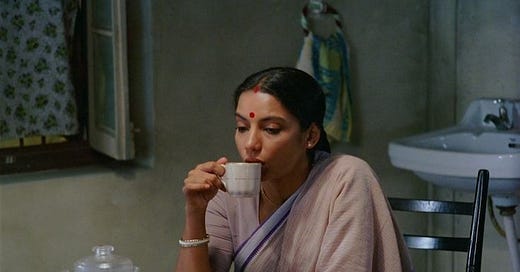I never drink my tea until it turns cold
Slow day, so I'm publishing the college admissions essay that got me waitlisted at an Ivy I could never have afforded to attend way back in 2021. Enjoy!
I almost never drink my tea until it turns cold.
I do this for reasons I’m not always sure of - maybe I forget, too engrossed in whatever else I’m doing. Complaints from my parents about the burgeoning prices of tea leaves and my idiosyncratic habits all aside, I used to think it a strange preference of drink– a colonial legacy forced into my life.
Ever since I can remember, I’d been scared of fire. Maybe I subconsciously gave in to nominative determinism: my name means daughter of the sea if you ask the right people. Whatever the reason, it didn’t help that all around me, things are good at burning, be it the bonfires of harvest festivals, the scorching summer heat, fossil fuels in car jams; or communal riots in India’s capital. Trial by fire – I think it’s the equivalent of a cosmic joke. I would have probably remained scared until much later if I hadn’t learned to command it – not by magic, but brewing a cup of tea the way my mother taught me: leaves curled into boiling hot water, bubbling over a tamed blue. Mama taught me the way she learned it from her own mother, down a long line of outspoken women, with a hand which was burned black several years ago while brewing tea – doing the same thing she is instructing me to do right now.
There is a lesson here somewhere.
Tea sees me through most things and most places, mundane and extraordinary. I balance on the upper berth of a train with a kettle during my family’s exhausting overnight journey back home with our two dogs, which I dub a travelling circus. I dip teabags into my team members’ hotel-issued mugs in Beijing as we share stories of success and regret and discuss strategies during our Model UN conference, which earns me the nickname ‘chamomile’. Closely reading the labels on tea packs helps me learn the differences between corporate and co-operative-owned tea businesses, leading me into a rabbit-hole of researching tea workers’ rights and legislations on tea plantation labour. I begin to understand the weight of the mug I hold in my hands.
Tea has taught me to embrace rather than resent hot things, like gulping down ginger tea the night before a challenging trigonometry test, the fiery pit in my stomach as I wait to speak in a conference, the pricking behind my eyes when I learn about injustice. Every time my breath catches or my hands turn cold, I remember my mother’s lesson: playing with fire pays off if you’re brave enough.
Challenges aren’t the only thing I learn to welcome. Emboldened by my mastery over fire, I begin to make tea for my family every day, drawing us together at regular intervals to talk and laugh together. I discover that my best friend and I drink our tea the same way. When I visit her for the first time in months, I stand next to her as she makes us both Darjeeling. Fittingly, I gift her a cat-eared mug for her birthday. The metaphor isn’t lost on me: instead of being an alien imposition, drinking tea has helped me become closer to myself and the people I love.
To return to my strange habit: I never drink tea until it is almost lukewarm. I still don’t exactly know why, but if I had to guess, it’s because more than enjoying the taste, I appreciate the duration of the companionship it has helped me find. Things might be good at burning where I come from, but my mug of tea helps me hold on to a quieter warmth.
Thus every afternoon, at 4pm, I walk into the kitchen to conduct this ritual, algorithmic yet comforting –four cups of water, a humming kettle and everyone’s favorite mugs. As if by magic, the four of us drift into the room without being told, gathered around the tray.
We sit in silence, but our hands are warm.





It is rare that a cup of tea is full of just water. It is its own third place!
Now everytime I make tea, it'll remind me of this. Loved it.